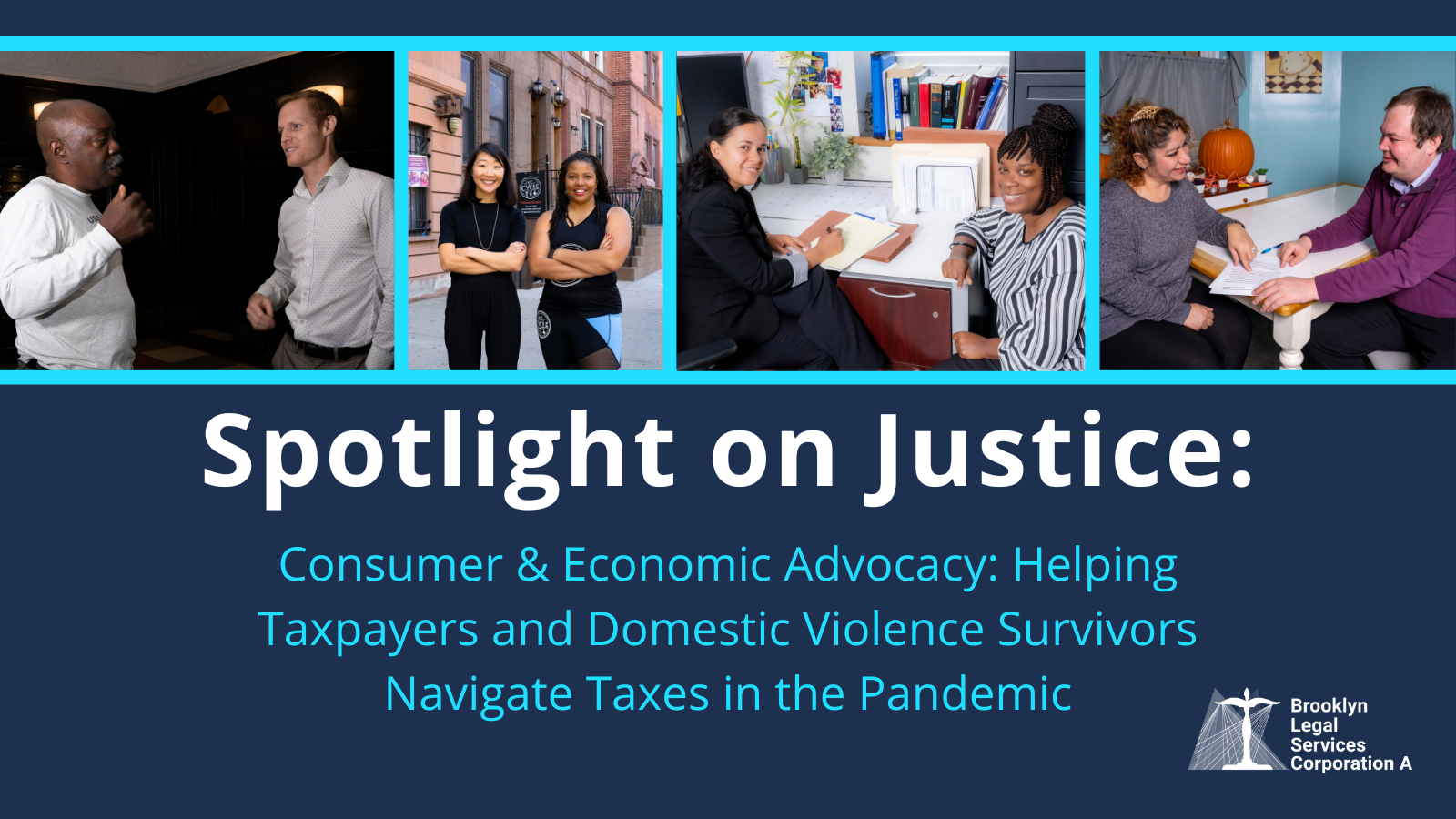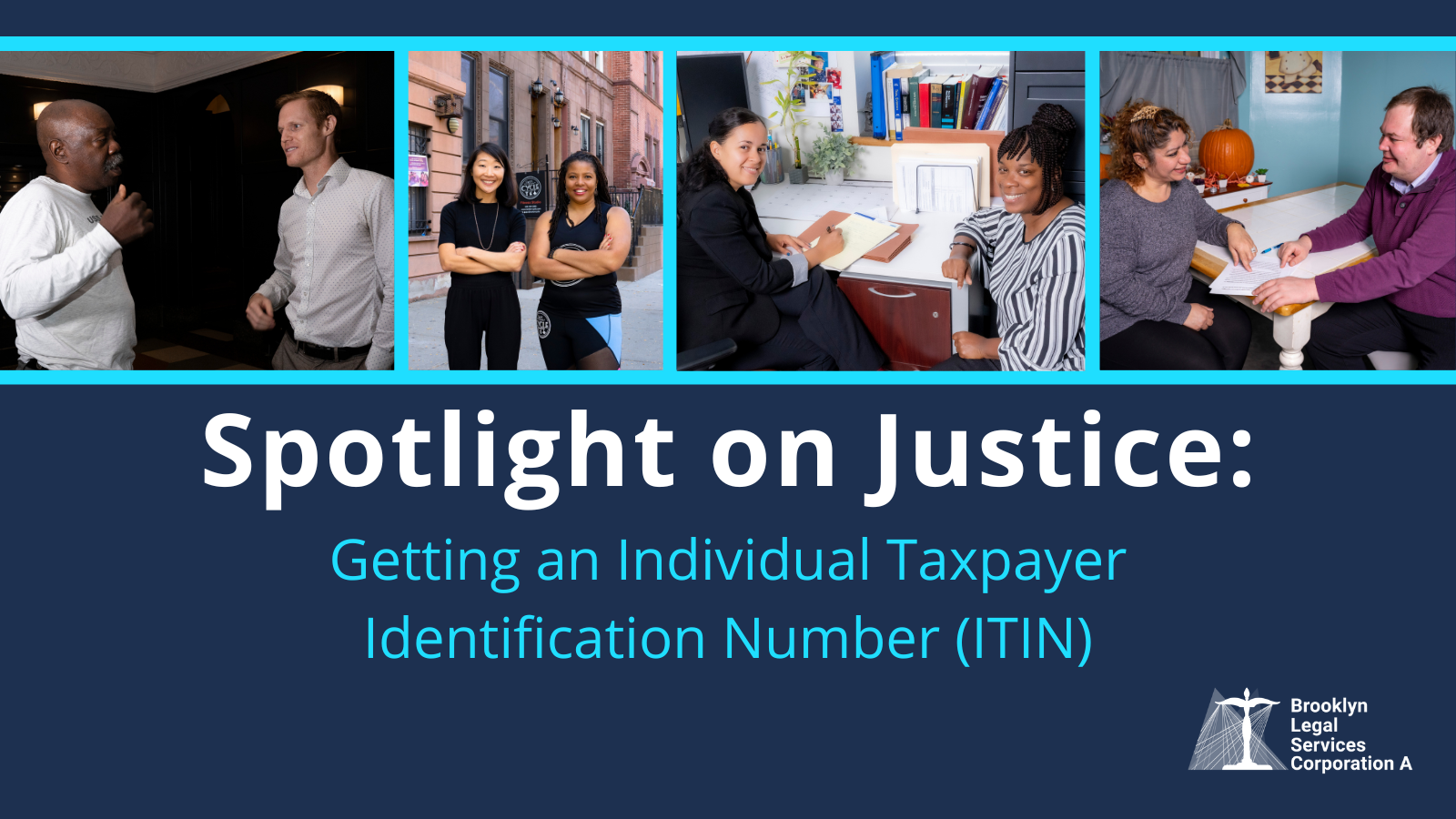By Cynthia Rosa Disclaimer: This advice is for informational purposes only and is not legal…

CEA: Helping Taxpayers and DV Survivors Navigate the Pandemic
By Serena Sankofa
Brooklyn A always strives to meet the needs of our community, and we paid close attention to the developing needs among our clients from the onset of the pandemic to best serve them. Our Consumer & Economic Advocacy Program (CEA) houses our Low-Income Taxpayer Clinic, and we saw countless New Yorkers struggling during the pandemic to pay their taxes—and, because of backup on the IRS side, we saw delays in getting returns processed, which meant delays in securing stimulus payments, credits and refunds owed to them.
We also observed a noticeable rise in domestic violence survivors among our clients, who experienced specific tax challenges over the last couple years tied to the abuse they had endured. Domestic violence has long been a prevalent issue for New Yorkers, and the tax issues highlighted the variety of challenges survivors face. We are very proud to now have a Domestic Violence Program at Brooklyn A that makes us better equipped to help New Yorkers experiencing these issues. Here are some of the trends we’ve observed in our work over the last year:
Taxpayer challenges since 2020
Taxes were still due in the spring of 2020, but the deadlines were extended both by the IRS and New York State Department of Taxation & Finance. With the shutdowns and general chaos of the early pandemic days making it harder to connect with people, many New Yorkers in need of relief were unaware of existing pathways to help them. It also became very difficult to contact both the IRS and New York State Department of Taxation & Finance in 2020—wait times on the phone jumped by several hours and made it nearly impossible for many to wait on hold long enough to connect with someone who could resolve their issue.
At Brooklyn A, we also observed the government was less willing to accept Offers in Compromise (OICs). OICs are deals taxpayers offer the government to settle a tax debt for less than the total owed, based on their income, in exchange for having the debt written off for good. Typically, the government won’t accept these offers if they believe the taxpayer is experiencing a temporary hardship that will be resolved within five years and allow them to pay the debt in full—this appears to be the logic the government used early in COVID, figuring the shutdowns won’t last forever. However, we did see that the Offers in Compromise that were accepted were for larger sums, and the IRS and NYS appeared to be rejecting offers more quickly and requiring larger payments.
The IRS issued relief with the People’s First Initiative, which relieved taxpayers from certain collection actions until mid-July of 2020, and taxpayers did receive relief from the Economic Impact Payments—better known as the stimulus payments. Brooklyn A helped many taxpayer clients to receive these funds in the first two years of the pandemic—we also hosted webinars and townhalls to inform taxpayers of the EIP payments. For those with up-to-date tax filings for 2018 and 2019, the money was routed directly to them, but those with complicated tax situations struggled to get that relief.
Domestic violence survivors unable to get stimulus checks
Throughout the pandemic there has been a rise in incoming clients who are experiencing domestic violence (DV), this has been particularly prevalent with our clients in the Low-Income Taxpayer Clinic (LITC). For comparison, in 2020 we had 8 clients (3 in foreclosure and 5 in the LITC) that identified as DV survivors; by 2022 we had 77 clients (11 in foreclosure, and 66 in the LITC). Across all Brooklyn A programs, we saw 21 such clients in Fiscal Year 2020, and 209 in FY2022. Some of this can be attributed to better screening and tracking internally, but the reality is that conditions of the pandemic exacerbated DV.
A report from the National Commission on COVID-19 and Criminal Justice found that domestic violence incidents increased by 8.1.% after the onset of the lockdowns in early 2020. While we have always received referrals from organizations working directly with clients experiencing DV, around the time of the lockdown we began specifically receiving referrals from organizations that run DV shelters, clients and usually their children as well were either forced out of their home or left due to worsening conditions in the household. Some of the most common issues we have seen in our LITC program are: stimulus payments (for the client and/or their children) fraudulently being issued directly to the abuser, abusers fraudulently claiming the client and/or the children on a tax return, and clients signing joint tax returns under duress.
The purpose of the stimulus payments was to provide immediate relief to taxpayers impacted by the pandemic; however, payments were issued based on how a client filed their 2018 or 2019 tax return; this meant that clients were reliant upon receiving that money from the person who filed the return, in this case, their abuser. Even after leaving the home, many abusers would still attempt to claim our clients and/or the children on the tax return, despite the fact that they did not live together and very rarely ever provided any direct support. Finally, some clients, through intimidation and coercion or ignorance of their own rights, might sign a tax return under duress to appease the abuser. For each of these issues, there are remedies present through the Internal Revenue Service (IRS), unfortunately the process is rarely quick and can be confusing and frustrating to navigate alone, particularly for someone that has other pressing concerns such as the livelihood and safety of themselves and/or their children.
The CEA Program utilizes our legal expertise in tax law to help clients navigate the IRS system and New York State Department of Taxation and Finance, and obtain the best possible remedy available to them, such as: US Tax court resolution, Penalty Abatement, Currently Non-Collectible status, Innocent Spouse Relief, Audit Reconsideration and more. We continue to receive regular referrals for clients experiencing DV that have a tax issue, and with the statute of limitations on the third stimulus payment set to expire in the spring of 2024, we expect this trend to continue.



